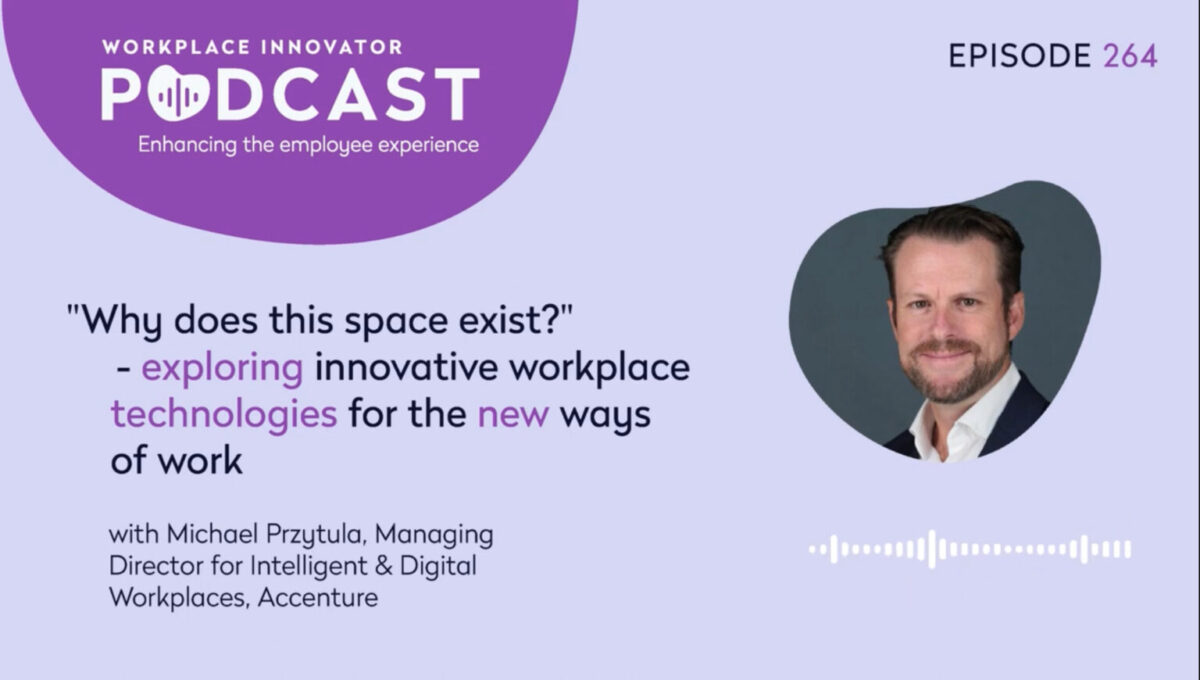
In episode 264 of Workplace Innovator, host Mike Petrusky speaks with Michael Prischula, Managing Director for Intelligent Digital Workplaces at Accenture. Together, they explore the intersection of facility management, real estate, and workplace strategy for helping organizations transform their work — including technology’s role.
Agenda
- Discuss the purpose of the workplace and why it matters for effective management and innovation.
- Examine the role technology plays in facility management and the workplace.
- How integrating tools and data makes for better decision-making.
- Modern office design with emphasis on creating spaces that serve people and their needs.
What you need to know: Workplace takeaways
Takeaways
Takeaway 1
Technology has a crucial role in redefining how people will work in the future
During the webinar, Prischula highlighted the importance of technology in transforming workplace norms. He emphasized that the current situation presents a unique, once-in-a-lifetime opportunity to redefine how people will work in the future.
“The strategic one that I’m seeing right now a lot is help me understand what’s actually going on in the spaces that I’ve got right. Who’s coming back? When are they coming back? How are they using spaces? Why are they coming back?” said Prischula. He stressed the need for understanding these factors to make strategic decisions about the workspace portfolio.
Prischula also pointed out the need for improving conference room experiences to ensure productivity in a hybrid environment. “Investments in how do we improve conference room experience, that experience of coming into the office for a specific purpose, for a specific meeting and making sure that that activity is as productive, if not more productive, than you can do when you’re sitting at home in the office.”
Takeaway 2
The purpose of the office in the future relies on understanding its current role
Prischula urged the audience to consider the purpose of the office and how it serves the employees and the organization. By understanding its role, companies can rebuild the vision for what the office needs to do and how it functions.
“One thing that I challenge all of our clients to do is ask themselves this one question. It’s like, what’s the purpose of your office? And I don’t mean that at a superficial level,” said Prischula. He further emphasized that understanding the purpose of the workspace is key to providing the necessary services and capabilities for the team and the people using the space.
“We have this once in a lifetime opportunity to define the way that people work, possibly for many generations to come. And so my question to your audience, or my challenge to your audience, really, Mike, is will they take the opportunity?” Prischula concluded.
Takeaway 3
Tools and technologies should be integrated to provide a better workplace experience
Prischula pointed out the abundance of tools available in the market and the challenge of having too many silos between these tools. He emphasized the need for understanding why these tools exist and how they contribute to the purpose of the workspace.
“I think that’s where many organizations are missing, and, quite honestly, where we get asked by a lot of our clients to help them bring these different either tools together. Bring data from different toolsets together to help them make decisions about either how they’re operating a space or how they need to change the space,” said Prischula. He suggested combining and leveraging the information and automation these tools provide to operate spaces more efficiently and improve the experience of people consuming it.
Workplace insights
- Organizations seek to understand how their spaces are used to make informed decisions about their portfolio.
- Collaboration spaces are becoming more critical as people return to the office for specific purposes, and these spaces need to be made hybrid-ready.
- There is a need to understand the purpose of the workplace, the tools used within it, and how these align with the needs of the employees and the organization.
- The future of the workplace is about creating spaces that serve people and meet their needs, contributing to productivity, community, and brand communication.
- There is a once-in-a-lifetime opportunity to define how people work, and organizations are challenged to seize this opportunity.




